- Home
- Juliet Marillier
Wildwood Dancing Page 17
Wildwood Dancing Read online
Page 17
“I don’t hate you, Jena.” His tone was constrained. He did not turn. “Quite the contrary. But you try me hard sometimes. I know you want to protect your sisters and your servants—that is admirable, as a general sentiment. But if one of them is concealing something … if one of them is in league with these destructive powers … I cannot believe that’s true, but I have to investigate the rumors. If the worst comes to pass, and someone in my own household has assisted these demonic folk, I must use what information they can give me to root out the evil—to destroy it once and for all.”
I was so angry I could hardly speak. “If you’re not careful,” I said, “your hatred will eat you up, Cezar. I don’t understand it. It has changed you so much that I hardly recognize you anymore. I know how terrible Costi’s death was for you. But it was so long ago. You have your own estate to look after, your community to watch over, your life to lead. It is frightening to have the Night People in our forest. It is terrible that Ivona died, and troubling that folk have lost livestock. But you’re a leader—you should be setting an example, not charging forward with the scent of blood in your nostrils and blind hatred in your heart. No matter how cruel the blow of losing your brother, it should never have made you lose your sense of what is right.”
He did not answer for a long time, just turned to stare at me. It was as if I were the one who had almost struck a blow. Eventually he said, “You can’t understand. You can’t know what it’s like to be offered something and for it to seem as if you’ve been given it, and then to find out it’s all a sham—that what you believed was a wonderful gift is worthless, cold, a dead promise. To pay an impossible price and get dross disguised as treasure; that is the cruelest thing. A leader, me? Hardly. Folk follow me because I’m the best they’ve got. That’s not saying much in a place like this. Yes, I’m angry. I want the truth—and when I have it, I’ll use it to destroy those who tricked me, those who played the most evil joke in the world on me. I will tear them apart, limb from limb, and then I will destroy their forest so that they can never return to haunt me. I will drive them even out of my dreams.”
“Evil joke?” I asked, my voice diminished to a thread. “What joke? What are you talking about?”
“Forget it, Jena,” said Cezar. “I don’t want to discuss this further tonight. In the morning I’ll hear what you have to say, each of you in turn. I’ll know if anyone’s lying. I won’t have the community intimidated by the forces of the forest, and I won’t have my household cursed and polluted by association with Drǎguţa the witch and her henchmen. Night People or not, she’s the one who is behind all this. She did it. She drowned Costi. She’s never let me forget that, not for one instant. People think life goes on after these things, that folk recover and get over it, that everything doesn’t change. That’s wrong, Jena. It never goes away. It won’t go away until I make it go. It won’t leave me until I crush it completely.”
Iulia and Paula had finished putting away the dishes; now they hovered in the doorway, waiting for me. Thank heaven for my sisters. I could forgive their small failings instantly, as long as they were there when I needed them. I put my hand around Gogu, inside my pocket. He was tensed up into a little ball, deeply distressed. “I don’t think I understand,” I told my cousin. “I’ve always believed we should try to put bad things behind us—not to forget them, but to learn from them and make the best use of that learning in our lives. If you can’t do that, you shouldn’t blame Drǎguţa or the folk of the forest. It’s your life—the only one who can live it is you. Now I’m going to bed, Cezar. If you ever try to hit me again, I will tell my father. And I’ll tell Aunt Bogdana, as well. Once I might possibly come to forgive. Twice will ensure you never regain my good opinion.”
In the quiet of our bedchamber, Stela was tucked under her quilt, almost asleep. There was no sign of Tati.
“Stela?” I crouched down by my little sister’s bed. “Where did Tati go?”
“I don’t know.”
“Jena.” Paula turned solemn eyes on me. “Her outdoor cloak’s gone.”
My stomach dropped; I felt sick. I thought of Tati’s wan, desperate appearance over these last days; her odd trips out into the forest; the way she seemed to drift along on the edges, as if she were not really part of our family anymore. I had told her about Tadeusz. I had told her about Dark of the Moon. “I think I’d better go and see if she’s all right,” I said as calmly as I could while my heart raced with terror. “I’ll just settle Gogu down first.”
I poured water into his bowl. My hands shook so much that the stream spilled over the rim.
“Jena,” said Iulia, “where do you think she’s gone? Why are you looking like that?”
“Like what?” I fished Gogu out of my pocket and set him by the water dish.
No, Jena! No.
“You look terrified,” Iulia said.
“I don’t want her to get in Cezar’s way. You saw what kind of mood he’s in. I’ll just slip out and bring her back.”
Jena, don’t go. Don’t do this.
“It’s Dark of the Moon,” Paula said. “You don’t think she might be planning to—?” She was not quite prepared to put my worst suspicion into words.
“Of course not,” I lied. “She doesn’t even know where to go; none of us do.” Call to me and I will take you there. “I’d better go now. Keep an eye on Gogu for me, will you?”
Take me with you. Jena! Don’t go without me!
I made for the door before the frog could leap onto my shoulder. I knew that if I picked him up again, I would find it impossible to leave him behind. “I shouldn’t be long,” I said, snatching my cloak from the peg where it hung. “Just go to sleep. I’ll see you in the morning.”
I imagined I could feel the horrified eyes of my sisters on my back as I went out. I heard a little thud as Gogu leaped from the table and made to follow me. I shut the door before he could reach it. If Tati was doing what I suspected, my only choice was to follow her, but I would not risk the safety of my little wise friend as well as my own.
I wanted to run, to find her as quickly as I could before it was too late. But I went cautiously, sidling from one corner to another, constantly watchful. If I drew Cezar’s attention, I would have to find an excuse for creeping about at night in my outdoor cloak, and then retreat to the bedchamber without my sister. There was no map to follow, no logic to choosing where I might look. An instinct I had not known I possessed drew me down one staircase and up another, past Father’s workroom, along a creaking gallery, then down the back way to the chamber that had once been our storeroom and was now swept bare and clean, waiting for the night of Full Moon.
The castle was dark. I had grabbed a candle before I went downstairs, but its feeble flickering did little to illuminate the cavernous spaces and shadowy corners of Piscul Dracului. I walked the length of the big chamber, the pillars rising into darkness on either side, the floor faintly gleaming as my small light passed over it. I went up a set of stone steps at the far end. From here it was possible to enter a musicians’ gallery set above the main chamber, or to climb still further to an open terrace looking out over dense forest. With the moon hidden, there would be nothing to see tonight. “Tati,” I whispered, “where are you? Don’t be gone already—please, please.…”
The door to the terrace was ajar, its chain unfastened and dangling. So much for Cezar’s precautions. I crept through and ascended another flight of steps to emerge on the stone terrace. The night was pitch-black and cold enough to freeze the breath the moment it left the body. I hugged my cloak around my shoulders, lifting the candle in a feeble attempt to light the darkness. “Tati? Are you here?”
There was a sudden movement by the parapet wall. She was standing close to the barrier, her face a pale oval in the fitful light, her eyes big and wild. The blue cloak shrouded her figure completely; her feet were in soft slippers. My sister was not alone. Beside her stood a tall, black-caped figure. It was not Sorrow. It was not Tadeusz. Those ruby li
ps, that snow-white skin, that elegant bearing, belonged to the woman of the Night People: the haughty Anastasia.
“Tati,” I gulped, “come inside. You can’t go. It’s too dangerous.” My voice sounded tiny—a child’s, ineffectual and meaningless.
Anastasia smiled, showing her unusual teeth. The effect was deeply troubling. “Take my arm, Tatiana,” she said, and her voice was as musical and as haunting as her brother’s, if brother he was. “I will lead you across. Sorrow is waiting for you just beyond the margin. Your sister is wrong. It’s perfectly safe. You’re women now—you are entitled to this.”
“No!” I cried out. “Tati, don’t!” I could see the longing in my sister’s eyes; Sorrow’s name had brought it sharply to life. As for me, I felt the urge to move forward, to obey the coaxing voice and follow wherever Anastasia bid me. I yearned to go. I needed knowledge. What she had said about being entitled warmed me. In her world, there were no men like Cezar to dismiss my aspirations and scorn my quest for independence.
“Come with us, Jenica,” Anastasia purred. “My brother waits to show you the mirror. It’s just on the other side. Come, take my hand.”
I hesitated, remembering the small, wise voice of Gogu raised in desperate protest. No, Jena! When had he ever been wrong?
“You waver,” the red-lipped woman said dismissively. “You are too cautious, like an old woman. Come, Tatiana.” And, as I watched, Tati slipped her arm through Anastasia’s. They moved away, beyond the small circle of light my candle cast on the cold stones. The portal could be anywhere. They might simply vanish; my sister might never come back. I imagined her pale and lifeless like Ivona, with the livid mark of a bite on her neck. I drew one long, uneven breath and launched myself after them.
The candle went out, and I was blind. I stumbled along the terrace, hoping I would catch them before they escaped my reach. Surely this was too far—there should be a wall.… Groping before me in the darkness, I touched something chill as winter: a thin-fingered, long-nailed hand. I clutched it, reminding myself to breathe. A moment later we were falling, falling, so far down that I knew our landing would be in a tumble of crushed flesh and broken bones. I screamed, but my voice drifted into nothing; instead, the cold air was full of the cries of strange birds, an eldritch music of night. I squeezed my eyes tightly shut, waiting for the ground to slam into my body.
I landed gently, my feet on a soft surface, my eyes still closed. From the distance came a sound of faint music. I opened my eyes.
We were by Tǎul Ielelor, on the path to Dancing Glade. There was the avenue of tall trees that led up to the sward; there was the little sandy shore where our boats would glide in to let us out. The lake was frozen over. Tonight its surface did not glimmer, but lay sullen and dark beneath the willows. Up in the trees, lanterns still hung, but their forms were changed: in place of beetle, bird, and butterfly were twisted forms of things not quite right—a cockroach with elongated teeth; a child with grimacing features and stunted limbs; a death’s-head; a worm-infested apple. The light they cast was dim and odd, rendering the landscape a greenish purple. Anastasia’s pale face was skull-like and my sister’s a terrified mask. I swallowed and released Anastasia’s chill hand, struggling for words. I could not berate Tati for her weakness. I had felt the same urge to come here. It was in my blood now as I walked after my sister and her guide up the pathway toward Ileana’s glade.
I willed myself to be silent. I would not ask, Where is Tadeusz? Where is Drăsuţa’s mirror? It seemed far wiser not to give the Night People the impression that I cared greatly for anything they might have to offer. I hoped Ileana would be here as usual and that I might petition her again, since it seemed the whole valley had now fallen under a malevolent shadow. I would simply ask her to send the Night People away. And if the queen of the forest laughed at a human girl for seeking influence in such grand matters, so be it.
I tried to grasp my sister’s arm so she would stay by my side, for I could see in her eyes that she would not listen to words of caution tonight, but Anastasia hurried her on. I would need to remain on my guard constantly to be certain I could bring Tati home safely. Home. I did not even know how we would get there. Anastasia did not seem like the kind of being who would snap her fingers and transport us back as soon as we grew tired. There were no boats on the lakeshore tonight. Never mind that: there would be folk I knew at Dancing Glade, folk who would help me if I needed them.
“Where’s Sorrow?” Tati asked. “You said he was just on the other side. He’s not here.” Her voice rose. “You lied to me! Where is he?”
Anastasia was walking briskly, her booted heels sinking deep into the damp soil. “Patience, patience, Tatiana. He will be here. He waits for you. He longs for you. I will take you to him.” And she drew Tati on, so fast that I had to break into a run to keep up. The trees seemed to reach out long fingers as we passed beneath, sharp and greedy; they clawed at my cloak and tangled in Tati’s long hair. She brushed them away, shuddering. “Keep up!” snapped Anastasia, her voice no longer beautiful. “You are too slow!”
On the edge of Ileana’s glade, we halted. The sward was full of dancing figures, as at Full Moon, but there was nothing familiar about it. I could not see tall Grigori, or big, blocky Sten, or diminutive Ildephonsus. I could not see the elegant form of the forest queen or the golden hair of her consort. Instead, a company of beings writhed and cavorted on the grass; Night People were among them, but there were also many that seemed part creature, part man or woman—a person with the head of a boar, a lady whose skin was all scales—and, here and there, stunted beings whose bodies were squashed up on themselves, hobbling in a grotesque mockery of a formal dance. Most disturbing of all, I saw human folk among the motley throng—men and women whose faces were not those of happy revelers but who bore trapped expressions, grimacing or fearful or plain mad. I saw a girl of around Paula’s age—pale-faced, solemn, delicately built—her dark hair tied back in a bow of black silk, her gown a small replica of Anastasia’s. She stood under the trees by the sward’s edge, watching gravely. Two tall women of the Night People flanked this slight figure; I could not escape the impression that they were acting as guards. The girl looked vaguely familiar. There was something deeply unsettling about the sight of her in this unlikely place; her frail innocence surely did not belong here. I saw that she was looking at a group of folk playing some kind of game with long barbed poles. They were throwing high, competing to reach a trussed-up bundle that hung on ropes from a willow bough. The bundle was wriggling, struggling—there was something alive inside it. A stick found its mark; a cry of pain came from the target.
Anastasia was already drawing Tati away. “Over here,” she commanded, making her way around the edge of the sward. I followed, my eyes drawn to a circle of Night People who were not dancing, merely standing and watching a figure that capered in the center. It was a man, a human being of middle years, dressed in the ragged remnants of a shepherd’s garb—long felt cape, conical hat—performing a crude kind of dance that jerked and contorted his body, as if a mad puppeteer were moving him against his will. I saw the agony in his eyes. He stared wildly at me, and his lips moved in a silent entreaty: Help me! Then Anastasia grabbed my arm and moved me on.
“Wait,” I protested. “That man—what are they doing to him? And what was that hung from the tree?”
Anastasia’s red lips curved in a smile entirely without mirth. “That man, and a woman of your kind, wandered a little too far,” she said. “Why would you protest? We have spared their lives: like many other foolish folk, they have become part of our revels.”
“But it looked as if that man couldn’t stop—as if he was forced to dance on and on, just so they could mock him.” I glanced back over my shoulder, but a frenzy of dancing creatures had moved between me and that sad, capering figure.
“Do not judge us, Jenica. Your own cousin tore one of Ileana’s folk apart, limb from limb. And for no good purpose, as it came about. Dwarves are ridiculousl
y loyal.”
I made myself ask. “Can you tell me which one it was? Was it Anatolie?”
She laughed. The sound of it rang in my ears, derisive and harsh. “What would I care? They all look the same to me.”
“Where’s Sorrow?” Tati had stopped walking, and there was a new look of determination on her face. “I’m not going a step farther until I see him.” She reached back and grasped my hand. “Nor is Jena.”
“That’s right,” I said, fixing Anastasia with an attempt at a glare. “If you can’t make good on your promises, we’re going straight back home.”
She laughed again, and this time the folk who were dancing close beside us halted and fell silent. Suddenly we had an audience—an audience in which not a single figure was familiar. Where were our friends from Ileana’s glade?
“Home?” It was Tadeusz’s voice. I whirled, letting go of Tati, and there he was, right behind us. “That could prove difficult, Jenica. You will not cross the Dark Between without one of us as your guide. Don’t look like that—we mean you no harm. A little insight, some entertainment, then we will take you safely back again. You have surprised me.” He moved forward, his hand coming up to touch my hair. “I had believed you lacked the courage for this.”
“I’m not here because I want to be,” I said through chattering teeth. “I’m here to make sure my sister comes home safely. And to tell you—” I halted. To come right out with a request—no, a demand—that they leave the valley alone, in front of such an audience, did not seem particularly wise. “There’s something I need to explain to you,” I told him. “I would prefer to do so in private.”
Tadeusz gave a knowing smile; it reminded me of the way Cezar sometimes looked.
“I didn’t mean—” I blurted out, mortified.
“Oh, but I think you did.” The voice was at its velvety best, insinuating itself into the deepest recesses of my mind. “Without wanting, you could not pass over. You and your sister both.” The dark eyes flicked to Tati and back again. “There will be time enough for private dalliance later. The night is long. Don’t you want to look into Drǎguţa’s magic mirror? When you have done so, we will have a hundred new things to talk about, Jena.”

 Den of Wolves
Den of Wolves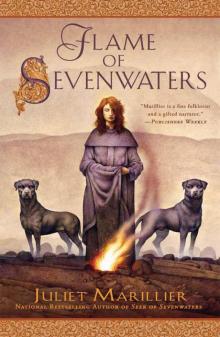 Flame of Sevenwaters
Flame of Sevenwaters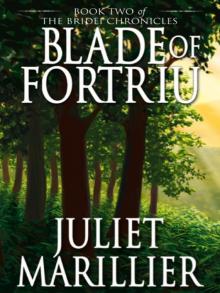 Blade of Fortriu
Blade of Fortriu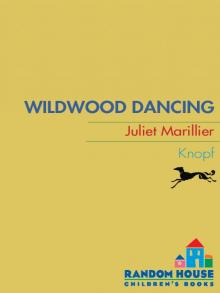 Wildwood Dancing
Wildwood Dancing Dreamer's Pool
Dreamer's Pool Raven Flight
Raven Flight Heir to Sevenwaters
Heir to Sevenwaters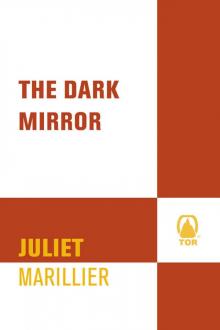 The Dark Mirror
The Dark Mirror Daughter of the Forest
Daughter of the Forest Seer of Sevenwaters
Seer of Sevenwaters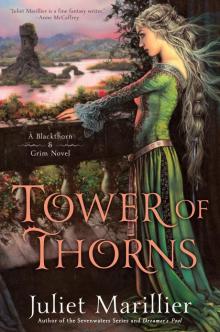 Tower of Thorns
Tower of Thorns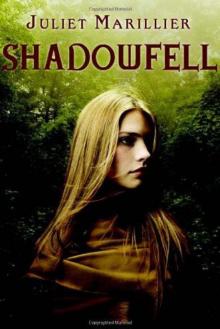 Shadowfell
Shadowfell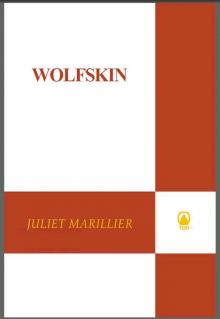 Wolfskin
Wolfskin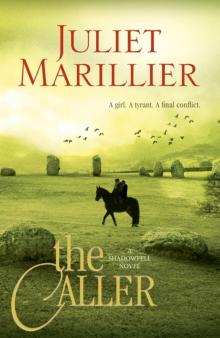 The Caller
The Caller Foxmask
Foxmask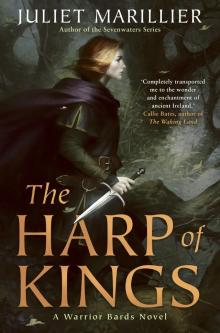 Harp of Kings
Harp of Kings The Well of Shades
The Well of Shades Heart's Blood
Heart's Blood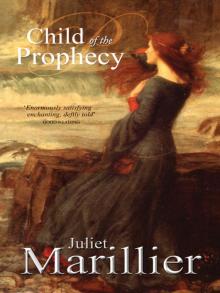 Child of the Prophecy
Child of the Prophecy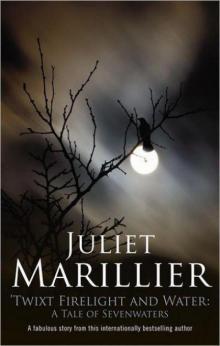 Twixt Firelight and Water
Twixt Firelight and Water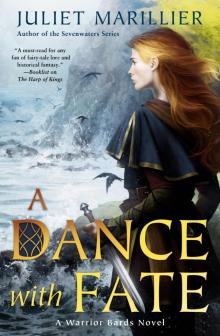 A Dance with Fate
A Dance with Fate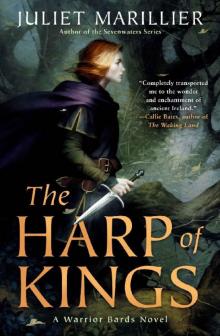 The Harp of Kings (Warrior Bards)
The Harp of Kings (Warrior Bards)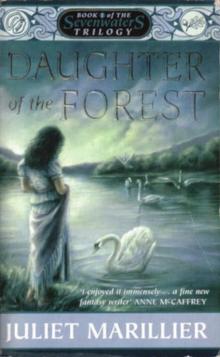 Daughter of the Forest (The Sevenwaters Trilogy)
Daughter of the Forest (The Sevenwaters Trilogy)![Sevenwaters [06] Flame of Sevenwaters Read online](http://i1.bookreadfree.com/i2/04/08/sevenwaters_06_flame_of_sevenwaters_preview.jpg) Sevenwaters [06] Flame of Sevenwaters
Sevenwaters [06] Flame of Sevenwaters![[Sevenwaters 04] Heir to Sevenwaters Read online](http://i1.bookreadfree.com/i2/04/12/sevenwaters_04_heir_to_sevenwaters_preview.jpg) [Sevenwaters 04] Heir to Sevenwaters
[Sevenwaters 04] Heir to Sevenwaters